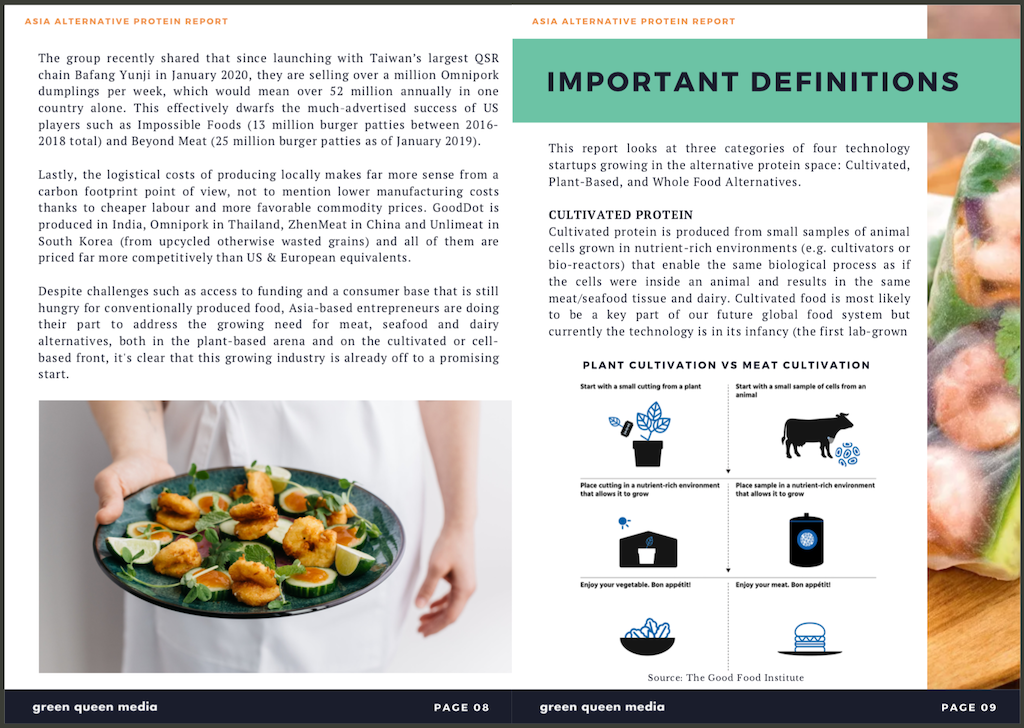4 Mins Read
Green Queen Media has just released Asia’s first-ever in-depth report on the alternative protein industry in the region. From definitions, regionally-specific sociocultural and environmental challenges and market trends to the latest “2.0” alternative protein startups, accelerators and potential areas for further innovation, the report is the most comprehensive look at the alternative protein industry in Asia to-date.
Drawing on primary data collected by the Green Queen Media team and secondary data from prior reports, analyses and research, “The Asia Alternative Protein Industry Report 2020: New Decade, New Protein” is the first of its kind to examine the region’s alternative protein development. Seeking to fill in the gap in knowledge and research into the sector, the report identifies key challenges and innovation highlights in Asia’s burgeoning industry that must grow to meet the continent’s increasing demand for protein consumption that comes with rapid urbanisation, socioeconomic mobility and explosive population growth.
“There is no bigger opportunity in sustainable food today than Asia,” says Sonalie Figueiras, Founder & Editor-in-Chief of Green Queen Media. “We published this report to put Asia’s food industry on the map and showcase the incredible innovation happening in alternative protein in the region.”
The report includes the most up-to-date information on the industry in Asia, and involved a total of over 50 extensive discussions, including 35 one-on-one interviews, with alternative protein stakeholders across 6 countries in Asia. The region is the sector’s fastest-growing globally, with annual growth predicted to be 9.3% until 2026.
Almost every single founder of Asia’s cohort of plant-based, cultivated and whole food meat alternative startups had been consulted or interviewed for the report, and the authors additionally drew on first-hand experiences at events as well as original reporting.
David Yeung, whose Green Monday Group is given an in-depth look in the report and highlighted as one of the industry’s major success stories called it a must-read “whether you are an investor, an entrepreneur, a government policy maker or simply a foodie” and added “with the triple threats of climate change, food insecurity and public health crises across all Asia, the time to rethink and re-examine the entire food value chain is now, and the first step is to take a deep dive and get well informed.”
Focusing on Asia, the continent currently home to half of the world’s population that will balloon to 5 billion by 2050, the report hopes to assist much-needed innovation, acceleration and support for the alternative protein space to meet the region’s future challenges in terms of food insecurity and its associated socioeconomic, environmental and health consequences.
All of these vulnerabilities are expected to be further magnified by the intensifying climate crisis, making the need for disruption to the current food system even more crucial. Given the sheer size and unprecedented rate of growth in Asia, regional shifts will inevitably create impacts that will reverberate across the world.
Although the authors acknowledge that Asia’s alternative protein industry is still in its early stages, it is in their view that the region is poised to dominate the global alternative protein market. Identifying Singapore and China as key innovation hubs driving home-grown products alongside the continued expansion of existing Western food tech players in Asia, the report argues that there is optimism for Asia to rise to the challenge and push forward a food revolution.
While recognising Asia’s long history, cultural religious practices and tradition of plant-based meat products, the report believes that the region is possesses an existing but growing group of homegrown “2.0” plant-based, cultivated and whole food startups who are most adept to developing products that appeal to the huge variations in local tastes, consumption habits and cuisines across and within the 38 countries that comprise Asia.
“The startups featured in this report are positioned to be some of the leading alt protein actors globally when considering the magnitude of the challenge they’re addressing, the quality of their products, and the complexity of protein consumption in Asia,” said report author Mackenzie Dion, who visited 6 countries and conducted over 35 face to face interviews for the report.
Nevertheless, the report spotlights key areas that the industry must overcome in order to meet the challenge of feeding its people safely and sustainably, from investment and funding to governmental support. The authors therefore urge for a shift in the new decade – from businesses and startups to scientists and researchers that make up the academia world and government players, we must all come together and drive the alternative protein revolution for the security of the planet and people who inhabit it.
The report is available to download for free, as per Green Queen’s impact media mission. “It is our sincere hope that this will help to inspire more founders to launch alternative protein companies, invite more investment into this exciting new sector, and support much-needed work to help feed the world’s most populous region safely and sustainably,” shared Figueiras

The full report, The Asia Alternative Protein Industry Report 2020: New Decade, New Protein, is now available for download for free.
Lead image featuring Omnipork courtesy of Green Monday & Green Queen Media.




